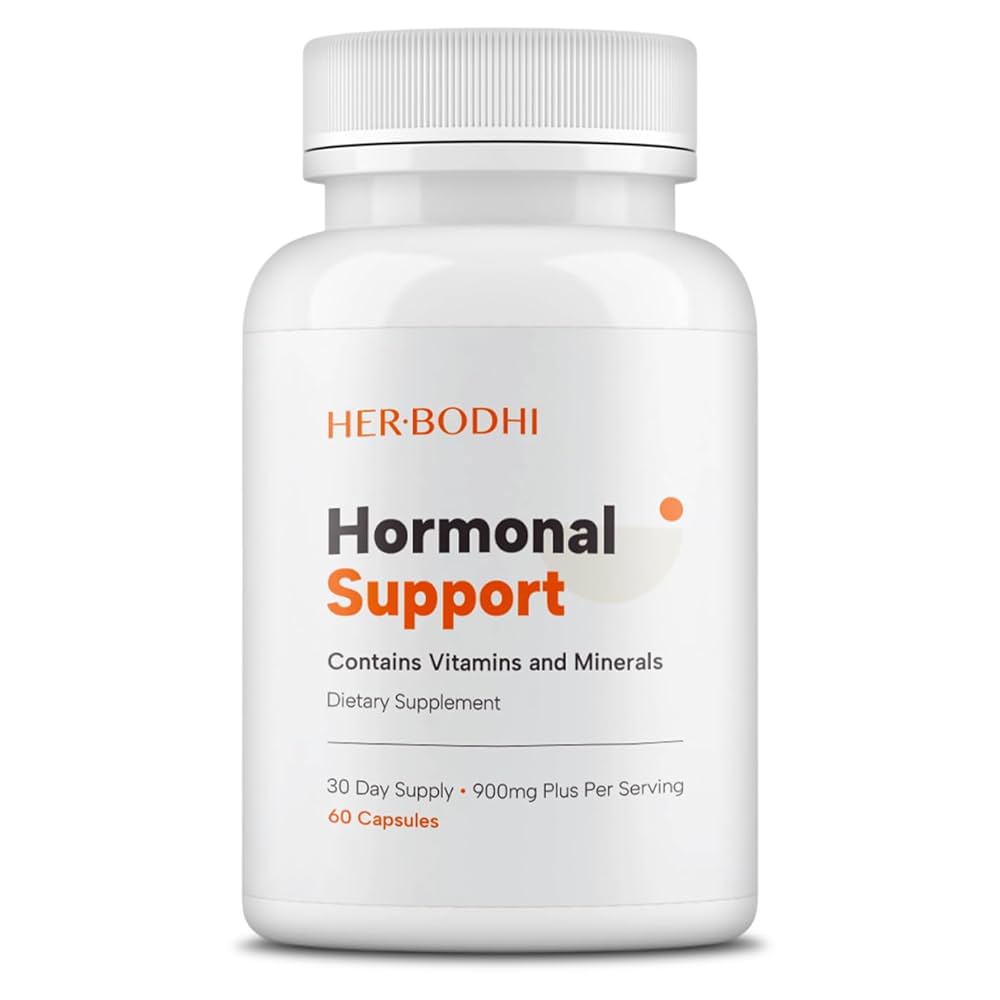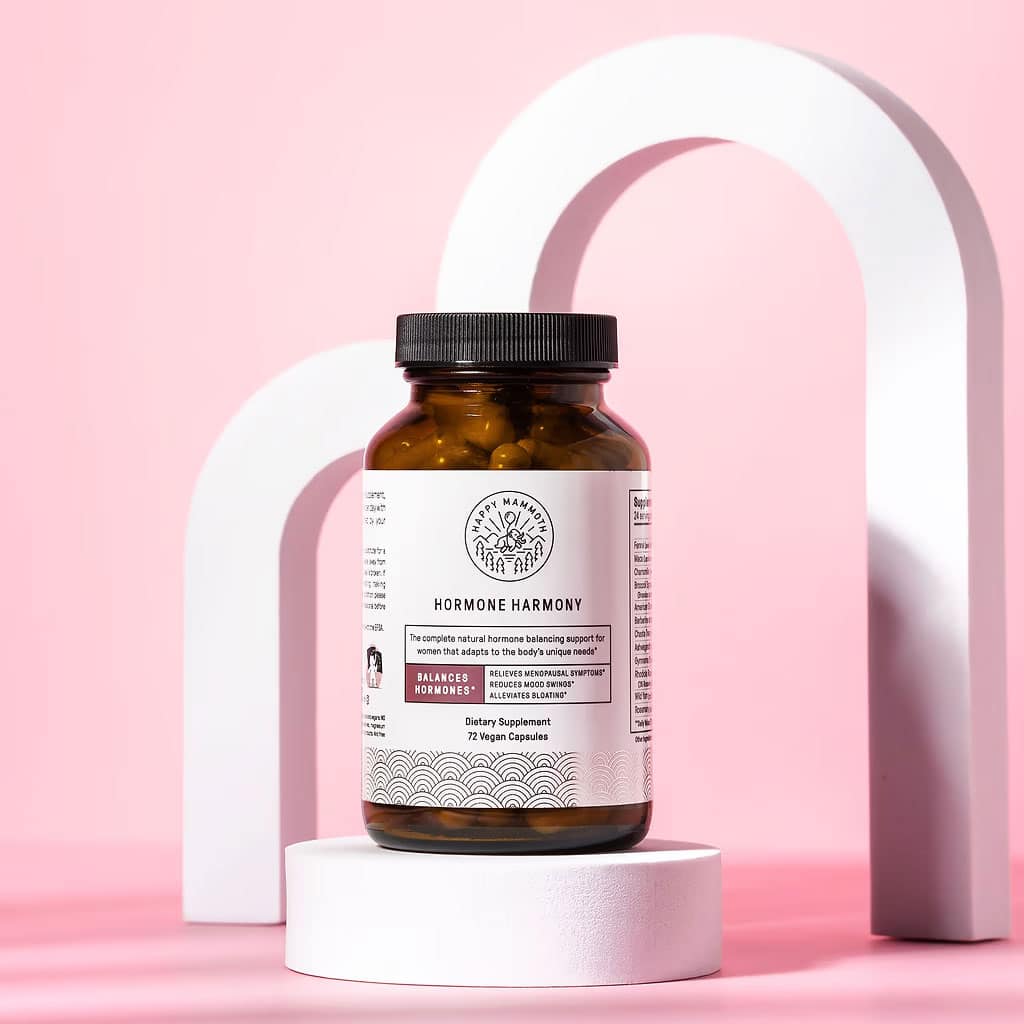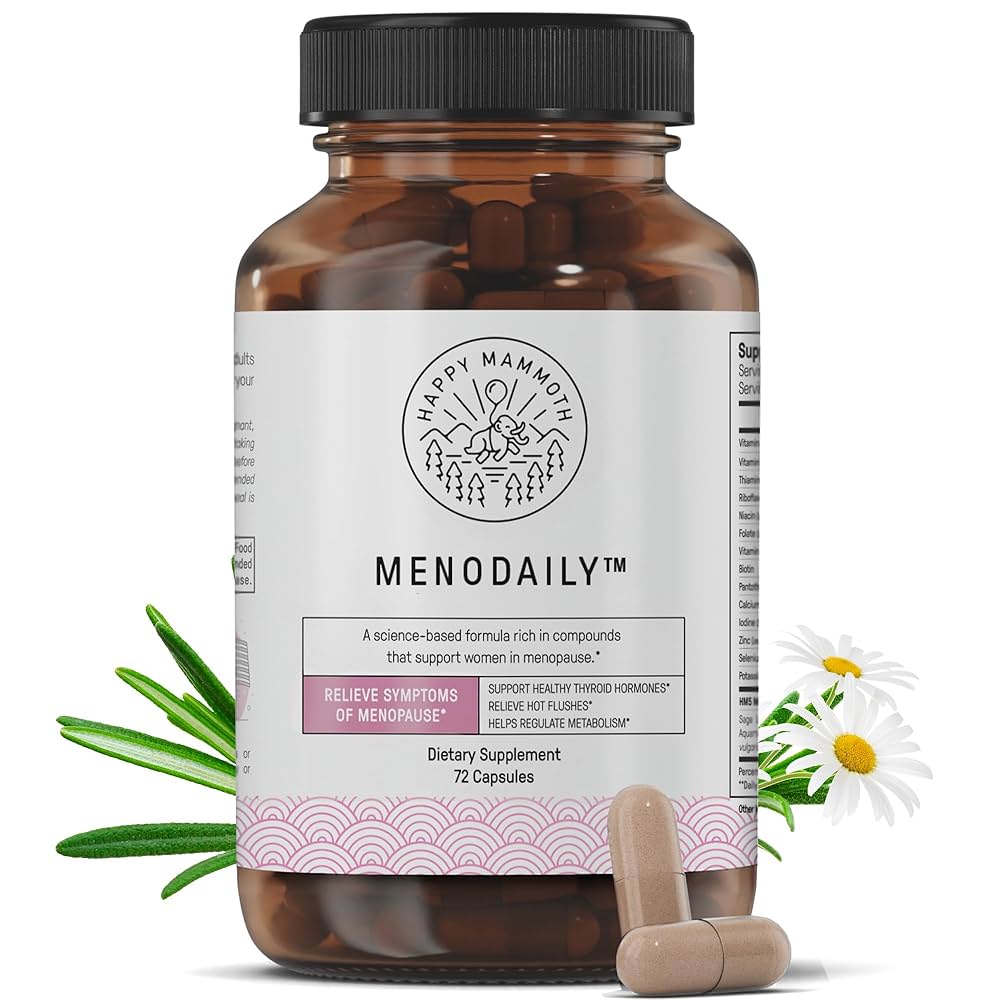Are you ready to embark on a transformative journey towards hormone harmony? Understanding the intricate dance of hormones can unlock the door to improved well-being, especially as you navigate the nuances of menstrual cycles and menopause. With biohacking techniques, you can actively restore balance through natural supplements, dietary changes, and mindful practices. Imagine feeling empowered to take charge of your health, inspired by real-life success stories along the way. Dive into this guide, and discover how to achieve a harmonious balance that fosters vitality and resilience throughout life’s transitions!
Understanding Hormone Harmony: The Key to Wellbeing
Hormone harmony is a crucial element in achieving overall well-being. It refers to the delicate balance of hormones in our bodies, which significantly influences our mood, energy levels, and physical health. When hormones act in harmony, they nourish and support various bodily functions, from regulating metabolism to enhancing reproductive health.
Here are some key points to consider about hormone harmony:
- Types of Hormones: Hormones like estrogen, progesterone, testosterone, cortisol, and insulin play distinct yet interconnected roles. A disruption in one can cause a domino effect on the others.
- Impact on Mood and Energy: Balanced hormones often result in improved mood stability, reduced anxiety, and sustained energy throughout the day. When harmony breaks down, you may experience irritability, fatigue, and other mood disorders.
- Physical Health Benefits: Maintaining hormone harmony can lead to benefits such as healthy weight management, improved libido, and enhanced sleep quality.
In contrast, hormonal imbalances can manifest as a variety of symptoms, including irregular menstrual cycles, weight gain, and fatigue. Understanding the importance of hormone harmony allows individuals to make informed choices, from diet and exercise to stress management, paving the way for a healthier life. Prioritize this balance, and unlock your path to vitality!

The Science of Menstrual Cycles and Hormonal Fluctuations
Understanding the science behind menstrual cycles and hormonal fluctuations is crucial for achieving hormone harmony. Each month, your body undergoes a complex interplay of hormones that impact not only your physical health but also your emotional well-being. Here’s an overview of how this fascinating process works:
Key Hormones Involved:
- Estrogen: Dominates the first half of the cycle, promoting egg development and thickening the uterine lining.
- Progesterone: Peaks in the second half, preparing the body for potential pregnancy. If pregnancy doesn’t occur, progesterone levels drop, leading to menstruation.
- Luteinizing Hormone (LH) & Follicle-Stimulating Hormone (FSH): Regulate ovarian function and the menstrual cycle.
Phases of the Menstrual Cycle:
| Phase | Duration | Hormonal Changes |
|---|---|---|
| Follicular | Days 1-14 | Increased estrogen |
| Ovulation | Day 14 | Surge in LH and FSH |
| Luteal | Days 15-28 | Increased progesterone, decreased estrogen |
Hormonal Fluctuations Impact:
- Physical symptoms: Bloating, cramps, and fatigue may arise during PMS.
- Emotional changes: Many women report mood swings, irritability, and anxiety.
By understanding these cycles, you can take proactive steps toward achieving hormone harmony. Regular tracking of your menstrual cycle can provide invaluable insights, enabling you to make informed choices about your health and well-being. Embrace this journey toward balance!
What is Biohacking and How Can It Help You?
Biohacking is a fascinating approach that empowers individuals to take control of their biology and optimize their health. This self-experimentation philosophy combines technology, nutrition, and lifestyle tweaks to enhance bodily functions, achieving hormone harmony in the process. Here’s how biohacking can aid in balancing hormones:
- Personalization: Each person’s hormonal landscape is unique. Biohacking encourages tailored plans based on individual needs, aiming for specific hormonal balance.
- Insightful Tracking: By leveraging wearable devices and apps, biohackers can monitor their physiological responses. Tracking elements like sleep patterns, diet, and exercise informs better choices that promote hormone harmony.
- Dietary Adjustments: Implementing precise nutritional strategies can dramatically influence your hormonal levels. A focus on whole foods, healthy fats, and adequate protein helps stabilize hormones.
- Stress Reduction: Biohacking emphasizes activities that lower stress levels, such as meditation or deep breathing exercises. Reducing stress leads to a healthier cortisol response, fostering hormone harmony.
- Supplementation: Biohackers often explore natural supplements that target hormonal health. These may include adaptogens, omega-3 fatty acids, and vitamins that support endocrine function.
Embracing biohacking not only enhances your understanding of your body but also facilitates a proactive approach to achieving hormone harmony and overall wellbeing.
Natural Supplements to Enhance Hormonal Balance
When it comes to achieving hormone harmony, natural supplements can serve as powerful allies. These supplements support hormonal balance, making the transition smoother during menstrual cycles and menopause. Here’s a closer look at some key supplements you may consider:
Top Natural Supplements:
- Maca Root:
- Benefits: Boosts energy, reduces anxiety, and supports reproductive health.
- Usage: Available in powder or capsule form. Aim for 1.5 to 3 grams daily.
- Evening Primrose Oil:
- Benefits: Alleviates PMS symptoms and regulates menstrual cycles.
- Usage: Typically taken in capsule form, around 500 mg to 1000 mg daily.
- Vitex (Chaste Tree Berry):
- Benefits: Promotes ovarian function and can ease menopause symptoms.
- Usage: Standard dosages range from 20 to 40 mg of the extract daily.
- Vitamine D:
- Benefits: Supports overall health and can enhance estrogen balance.
- Usage: Consult with a healthcare provider for proper dosage.
Quick Comparison Table:
| Supplement | Main Benefit | Typical Dosage |
|---|---|---|
| Maca Root | Boosts energy and mood | 1.5 – 3 grams daily |
| Evening Primrose Oil | Eases PMS symptoms | 500 – 1000 mg daily |
| Vitex | Supports ovarian function | 20 – 40 mg daily |
| Vitamin D | Enhances estrogen balance | Consult a healthcare provider |
Incorporating these natural supplements into your routine can significantly enhance your journey toward hormone harmony. Always consult a healthcare professional before starting any new supplements, ensuring they fit your unique health needs. Embrace this pathway and feel empowered in your hormonal health journey!
Please click here to buy supplements for Hormone Harmony from Amazon.

Diving into Dietary Changes for Hormone Health
When it comes to achieving hormone harmony, your diet plays a pivotal role. What you eat directly influences hormonal balance, impacting everything from mood to energy levels. Let’s explore some dietary changes that can help you create a more balanced hormonal environment.
Incorporate These Hormone-Aiding Foods:
- Healthy Fats: Avocados, nuts, and olive oil provide essential fatty acids that promote hormone production.
- Fiber-Rich Foods: Whole grains, fruits, and vegetables help regulate insulin and maintain stable blood sugar levels.
- Lean Proteins: Incorporating chicken, fish, and plant-based proteins supports muscle health, which influences hormone balance.
Foods to Limit or Avoid:
- Refined Sugars: High sugar intake can lead to insulin resistance, disrupting hormone levels.
- Processed Foods: Often high in unhealthy fats and additives, which can negatively impact hormone harmony.
- Caffeine and Alcohol: Excess consumption may cause fluctuations in stress hormones and affect sleep patterns.
Sample Daily Meal Plan for Hormone Health:
| Meal | Options |
|---|---|
| Breakfast | Smoothie with spinach, banana, and almond butter |
| Lunch | Quinoa salad with chickpeas, veggies, and olive oil |
| Snack | Greek yogurt with berries and walnuts |
| Dinner | Grilled salmon with sweet potatoes and broccoli |
By making conscious dietary choices, you actively support your body’s quest for hormone harmony. Remember, every small adjustment can lead to significant improvements in how you feel!
The Power of Exercise in Balancing Hormones
Exercise plays a crucial role in achieving hormone harmony. Physical activity not only boosts your mood but also regulates and balances your hormones effectively. Here’s how exercise contributes to hormone balance:
- Reduces Stress Hormones: Engaging in regular physical activity lowers cortisol levels, the stress hormone that can wreak havoc on your hormonal landscape.
- Boosts Endorphins: Exercise increases endorphin production, promoting feelings of happiness and reducing anxiety, which can further support hormone harmony.
- Improves Insulin Sensitivity: Regular workouts can enhance insulin sensitivity, crucial for maintaining balanced blood sugar levels and reducing the risk of hormone-related issues.
- Supports Thyroid Function: Exercise stimulates thyroid function, essential for metabolic health and energy production.
Types of Exercise to Embrace
To achieve optimal hormone harmony, consider including a mix of the following exercises in your routine:
| Exercise Type | Benefits |
|---|---|
| Strength Training | Builds muscle, boosts metabolism, and regulates hormones |
| Cardio | Enhances heart health and aids weight management |
| Yoga | Reduces stress and promotes relaxation |
| High-Intensity Interval Training (HIIT) | Increases metabolism and has positive effects on insulin sensitivity |
Incorporating a variety of exercises not only makes it enjoyable but also ensures a comprehensive approach to hormone balance. Remember, consistency is key! Make exercise a regular part of your life and watch as your journey towards hormone harmony unfolds.
Mindfulness and Stress Management Techniques
Achieving hormone harmony is not only about physical health; it also deeply involves mental well-being. Stress can wreak havoc on your hormonal balance, leading to irregular cycles and intensified menopausal symptoms. Therefore, incorporating mindfulness and stress management techniques is essential for a smooth transition into a balanced hormonal state.
Here are some effective methods to manage stress:
- Meditation: Engaging in daily meditation helps calm the mind, reduces cortisol levels, and encourages emotional regulation. Aim for just 10-15 minutes a day to foster a more balanced state.
- Deep Breathing Exercises: Simple techniques like diaphragmatic breathing can significantly lower stress. Inhale deeply through your nose, hold for a few seconds, and exhale through your mouth.
- Yoga: Incorporating yoga into your routine not only increases flexibility but also helps to center the mind and regulate hormonal rhythms. Look for classes focused on restorative or hatha styles.
- Journaling: Expressing your thoughts and feelings by writing can help process emotions and relieve stress. Set aside time each week to reflect and write.
- Gratitude Practices: Focusing on what you are grateful for can shift your perspective, enhance mood, and improve overall emotional health.
By prioritizing these mindfulness techniques, you pave the way toward achieving hormone harmony. A balanced mind contributes to a stable hormonal environment, enhancing your journey toward overall well-being.

Exploring Alternative Therapies for Menopause Relief
Navigating through menopause can be challenging, but embracing alternative therapies may provide significant relief, enhancing your journey toward hormone harmony. These therapies work holistically, offering natural ways to alleviate symptoms and promote overall wellbeing. Here are some effective alternatives:
- Acupuncture: This ancient practice helps restore balance by stimulating acupuncture points, potentially reducing hot flashes and night sweats.
- Herbal Remedies: Certain herbs, like black cohosh and red clover, are known to alleviate menopausal symptoms. They mimic estrogen effects, helping to ease discomfort related to hormone fluctuations.
- Yoga & Tai Chi: These gentle exercises not only enhance flexibility and strength but also reduce stress levels, leading to improved hormone balance.
- Aromatherapy: Essential oils such as lavender and chamomile promote relaxation and can help alleviate mood swings and insomnia commonly associated with menopause.
| Therapy | Benefits | Considerations |
|---|---|---|
| Acupuncture | Reduces hot flashes, enhances mood | Seek a certified practitioner |
| Herbal Remedies | Eases symptoms, mimics estrogen | Consult with a healthcare provider |
| Yoga & Tai Chi | Relieves stress, boosts physical health | Choose suitable classes |
| Aromatherapy | Promotes relaxation, improves sleep quality | Use high-quality oils |
Incorporating these alternative therapies can contribute to achieving hormone harmony, offering you the relief you seek during this transitional phase. Explore these options, and remember, it’s essential to find what works best for you!
Creating a Personalized Hormone Harmony Plan
Crafting a personalized hormone harmony plan can drastically enhance your well-being and help manage hormonal fluctuations. A tailored strategy focuses on your unique needs and lifestyle. Follow these steps to create your own:
1. Assess Your Current Health Status
- Keep a journal of your menstrual cycle, noting any symptoms, mood variations, and energy levels.
- Consider consulting a healthcare professional to analyze your hormone levels through blood tests.
2. Set Clear Goals
- Define what you aim to achieve: better mood stability, reduced PMS symptoms, or smoother menopause transitions.
3. Choose Natural Supplements
- Incorporate herbal supplements like Maca root or evening primrose oil, known for promoting hormone harmony.
4. Revise Your Diet
- Focus on whole foods rich in omega-3 fats, fiber, and antioxidants.
- Consider a balanced intake of proteins, healthy fats, and complex carbs.
5. Incorporate Regular Exercise
- Aim for at least 30 minutes of moderate exercise most days. Activities like yoga and strength training can enhance hormone harmony.
6. Implement Mindfulness Practices
- Techniques such as meditation or deep breathing can significantly reduce stress, promoting a balanced hormonal environment.
By following these steps, you can develop a personalized hormone harmony plan that suits your lifestyle. Listen to your body and adjust your plan as needed, ensuring it evolves alongside your health journey!
Success Stories: Real-Life Transformations
Real-life transformations are powerful testimonials to the effectiveness of achieving hormone harmony. Many individuals have shared their journeys, showcasing how embracing hormone harmony has drastically improved their lives.
Here are a few inspiring stories:
- Emma’s Journey: After struggling with debilitating PMS and menopause symptoms, Emma implemented a personalized plan focusing on diet and mindfulness. Within three months, she experienced significant symptom relief, regained energy, and felt more balanced, proving that natural supplements, combined with lifestyle changes, can promote hormone harmony.
- James’ Transformation: James, a busy professional, discovered hormonal imbalances contributing to his stress and fatigue. By biohacking his routine—introducing exercise and stress management techniques—he dramatically improved his mood and productivity. Now, he champions hormone harmony, inspiring colleagues to explore similar changes.
- Sophia’s Success: After years of battling mood swings and irregular cycles, Sophia found hope through alternative therapies like acupuncture and herbal medicine. Her investment in hormone harmony not only alleviated her anxiety but also restored her sense of self.
These real-life transformations illustrate how practical approaches to hormone harmony can yield remarkable results. Through personalized plans, individuals can reclaim their health and well-being, paving the way for joyful, balanced lives. With dedication and support, anyone can embark on their unique journey toward hormone harmony and experience these transformative benefits.

Conclusion: Embrace Your Journey to Hormone Balance
Achieving hormone harmony isn’t merely a destination; it’s a rewarding journey. As you navigate through the ups and downs of hormonal changes, whether due to menstrual cycles or menopause, remember that small, consistent steps can lead to significant improvements in your overall wellbeing.
Here are some key takeaways to keep in mind:
- Personalization is Key: Understand that each body is unique. Tailor your approach to what feels right for you.
- Importance of Lifestyle Choices: Incorporate dietary changes, exercise, and mindfulness into your routine. Each element plays a crucial role in fostering hormone harmony.
- Seek Support: Don’t hesitate to talk to healthcare professionals or join communities focused on hormonal health. Sharing experiences can provide both insights and encouragement.
As you embark on this path, celebrate every milestone—be it a better mood, improved sleep, or more energy. Remember that achieving balance takes time, patience, and dedication. Embrace the learning process and stay open to adjustments along the way.
In essence, by prioritizing your hormone health, you empower yourself to thrive in all aspects of life. Embrace your journey toward hormone harmony, and watch as vibrant well-being unfolds!
Frequently Asked Questions
What is biohacking, and how does it relate to hormone balance?
Biohacking is a dynamic approach to self-improvement that combines biology, technology, and lifestyle changes to optimize health and wellbeing. In the context of hormone balance, biohacking involves understanding your body’s hormonal rhythms and making intentional changes, whether through diet, exercise, sleep, or supplements, to enhance hormonal health and achieve balance. This proactive approach empowers individuals to take control of their hormonal cycles and alleviate issues related to menopause and other hormonal imbalances.
What are some natural methods to support balanced hormone cycles?
There are numerous natural methods to support balanced hormone cycles. Key strategies include maintaining a balanced diet rich in whole foods, omega-3 fatty acids, and antioxidants, alongside regular physical activity to regulate metabolism and reduce stress. Furthermore, managing stress through mindfulness practices such as yoga, meditation, and deep breathing exercises can help maintain hormonal balance. Additionally, sufficient sleep is crucial, as it restores and rejuvenates hormonal function, ensuring cycles remain regular and symptom-free.
Can dietary changes significantly impact hormonal health?
Absolutely! Dietary changes can have a profound impact on hormonal health. Foods rich in phytoestrogens, like soy products, flaxseeds, and whole grains, can help balance estrogen levels. Additionally, incorporating healthy fats, such as avocados, nuts, and olive oil, can aid in hormone production. Avoiding processed sugars and refined carbohydrates is equally vital as these can lead to insulin resistance and hormonal imbalances. Thus, a holistic, nutrient-dense diet fosters optimal hormonal function and relief from menopause symptoms.
What role does exercise play in hormone regulation?
Exercise plays a crucial role in hormone regulation, acting as a natural antidepressant and mood enhancer. Physical activity stimulates the production of endorphins, dopamine, and serotonin, which help mitigate stress and anxiety, both known to disrupt hormonal balance. Additionally, regular exercise can improve insulin sensitivity and facilitate weight management, further aiding hormone regulation. Whether through cardio, strength training, or yoga, finding the right balance of exercise enhances both emotional and physical health, promoting well-being during hormonal fluctuations.
How can one identify if they have a hormonal imbalance?
Identifying a hormonal imbalance can involve recognizing certain signs and symptoms, such as irregular periods, excessive fatigue, mood swings, weight gain, or changes in hair and skin health. Additionally, conditions like PCOS and menopause manifest through specific hormonal shifts. Consulting a healthcare provider for comprehensive hormone testing can provide clarity and confirm imbalances. Keeping a symptom diary can also help track patterns and changes over time, facilitating informed discussions with health professionals to explore personalized solutions.
